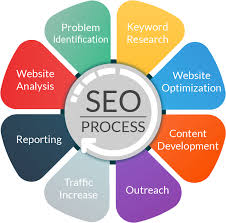The Power of SEO Marketing
In the digital age, Search Engine Optimization (SEO) has become a crucial tool for businesses looking to enhance their online presence and reach a wider audience. SEO marketing involves optimizing your website content and structure to improve its visibility on search engine results pages.
One of the key benefits of SEO marketing is its ability to drive organic traffic to your website. By ranking higher on search engine results pages for relevant keywords, you can attract more visitors who are actively searching for products or services that you offer. This targeted traffic is more likely to convert into leads or customers, resulting in a higher return on investment.
Moreover, SEO marketing helps build credibility and trust with your audience. When your website appears at the top of search results, users perceive your brand as more authoritative and trustworthy. This can lead to increased brand awareness and loyalty over time.
Another advantage of SEO marketing is its cost-effectiveness compared to traditional advertising methods. Once you have optimized your website for search engines, the organic traffic it generates can continue to benefit your business without incurring additional costs. This makes SEO a sustainable long-term strategy for driving online growth.
Furthermore, SEO marketing allows you to gain valuable insights into user behaviour and preferences. By analysing data such as keyword performance and user engagement metrics, you can refine your marketing strategies and tailor your content to better meet the needs of your target audience.
In conclusion, SEO marketing is a powerful tool that can help businesses improve their online visibility, attract quality traffic, and build brand credibility. By investing in SEO strategies tailored to your business goals, you can unlock new opportunities for growth and success in the competitive digital landscape.
Top 20 FAQs About SEO Marketing: A Comprehensive Guide
- What is the full form of SEO?
- How do I create a SEO marketing?
- What is SEO for marketing?
- What is a SEO in marketing?
- What are the 3 types of SEO?
- What are SEO in marketing?
- How do I start SEO marketing?
- What is SEO marketing?
- Is SEO marketing paid?
- How is SEO marketing done?
- What are the 4 stages of SEO?
- How do I SEO my website?
- What is SEO vs SEM?
- Can I do SEO on my own?
- What is the SEO strategy of marketing?
- What is SEO marketing course?
- What is SEO and how is it done?
- What are the 4 types of SEO?
- What are the 7 types of SEO?
- What is an example of SEO marketing?
What is the full form of SEO?
SEO stands for Search Engine Optimization. It is a digital marketing strategy aimed at improving a website’s visibility on search engine results pages. By optimising various aspects of a website, such as content, keywords, and backlinks, SEO helps businesses attract organic traffic and enhance their online presence. Implementing effective SEO techniques can lead to higher search engine rankings, increased website traffic, and ultimately, improved conversion rates.
How do I create a SEO marketing?
Creating an effective SEO marketing strategy involves a combination of technical expertise, keyword research, content optimisation, and continuous monitoring and adjustments. To begin, it is essential to conduct thorough keyword research to identify relevant terms and phrases that your target audience is searching for. This forms the foundation of your content strategy. Next, optimise your website’s structure and content to align with these keywords and improve its visibility on search engine results pages. Regularly update and refine your content to ensure it remains relevant and engaging for users. Monitoring key performance indicators such as organic traffic, keyword rankings, and conversion rates allows you to assess the effectiveness of your SEO efforts and make informed decisions for ongoing improvement.
What is SEO for marketing?
SEO for marketing refers to the strategic practice of optimising a website’s content, structure, and performance to improve its visibility and ranking on search engine results pages. By incorporating relevant keywords, enhancing user experience, and adhering to search engine guidelines, SEO marketing aims to attract organic traffic and increase the likelihood of reaching target audiences actively seeking products or services offered by a business. Essentially, SEO for marketing is a powerful tool that enables businesses to enhance their online presence, drive quality traffic, and ultimately achieve their marketing objectives in the digital landscape.
What is a SEO in marketing?
Search Engine Optimization (SEO) in marketing refers to the practice of optimizing a website’s content, structure, and other elements to improve its visibility on search engine results pages. Essentially, SEO aims to enhance a website’s ranking for specific keywords relevant to its products or services. By implementing SEO strategies such as keyword research, on-page optimization, and link building, businesses can attract organic traffic from search engines like Google. SEO is a fundamental aspect of digital marketing that helps businesses increase their online presence, drive targeted traffic to their website, and ultimately boost their visibility and credibility in the competitive online landscape.
What are the 3 types of SEO?
In SEO marketing, there are three main types of SEO that businesses can utilise to improve their online visibility and attract more organic traffic. The first type is on-page SEO, which involves optimizing individual web pages with relevant keywords, meta tags, and high-quality content to enhance their search engine ranking. The second type is off-page SEO, which focuses on building external links and establishing a strong online presence through strategies such as link building, social media marketing, and influencer collaborations. Lastly, technical SEO involves optimizing the technical aspects of a website, such as site speed, mobile-friendliness, and site architecture, to ensure optimal performance and user experience. By incorporating all three types of SEO into their digital marketing strategy, businesses can enhance their online presence and reach a wider audience effectively.
What are SEO in marketing?
SEO in marketing refers to Search Engine Optimization, a set of strategies and techniques aimed at improving a website’s visibility and ranking on search engine results pages. In essence, SEO helps businesses enhance their online presence by optimising their website content, structure, and performance to align with search engine algorithms. By implementing SEO practices such as keyword research, on-page optimization, link building, and content creation, businesses can attract more organic traffic from search engines like Google. Ultimately, SEO in marketing plays a critical role in driving targeted traffic to websites, increasing brand visibility, and ultimately boosting online success.
How do I start SEO marketing?
To start SEO marketing, it is essential to begin with a solid foundation. The first step is to conduct thorough keyword research to identify relevant terms and phrases that your target audience is searching for. Next, optimise your website’s on-page elements, such as meta tags, headings, and content, to align with these keywords. Creating high-quality, engaging content that provides value to users is also crucial for SEO success. Additionally, building backlinks from reputable sources can help improve your website’s authority and visibility in search engine results. Regularly monitoring and analysing your SEO performance through tools like Google Analytics will allow you to track progress and make informed decisions to further enhance your SEO marketing efforts.
What is SEO marketing?
SEO marketing, short for Search Engine Optimization marketing, is a strategic approach aimed at enhancing a website’s visibility and ranking on search engine results pages. It involves various techniques and practices to optimise website content, structure, and performance in order to attract organic traffic from search engines. By targeting relevant keywords and improving the overall user experience, SEO marketing helps businesses increase their online presence, drive quality traffic to their websites, and ultimately boost their brand visibility and credibility in the digital landscape.
Is SEO marketing paid?
The practice of SEO marketing itself is not paid, as it primarily involves optimizing a website’s content and structure to improve its visibility on search engine results pages organically. However, businesses may choose to invest in paid advertising strategies such as pay-per-click (PPC) campaigns to complement their SEO efforts and further enhance their online presence. While SEO focuses on improving organic search rankings, paid advertising can provide immediate visibility through sponsored ads. Ultimately, a well-rounded digital marketing strategy may include a combination of both SEO and paid tactics to maximise reach and drive targeted traffic to a website.
How is SEO marketing done?
SEO marketing is typically done through a strategic approach that involves various techniques aimed at improving a website’s visibility on search engine results pages. The process begins with thorough keyword research to identify relevant terms and phrases that users are searching for. These keywords are strategically incorporated into the website’s content, meta tags, and headers to signal to search engines what the site is about. Additionally, on-page optimization, such as improving site speed, mobile-friendliness, and user experience, plays a crucial role in SEO marketing. Off-page strategies like link building and social media promotion also contribute to boosting a website’s authority and credibility in the eyes of search engines. Regular monitoring and analysis of performance metrics help refine SEO strategies over time to ensure continued improvement in search engine rankings and organic traffic growth.
What are the 4 stages of SEO?
In the realm of SEO marketing, understanding the four stages of Search Engine Optimization is crucial for achieving online success. The first stage involves conducting comprehensive keyword research to identify relevant terms and phrases that align with your business goals. Next, comes on-page optimization, where website content and structure are fine-tuned to improve search engine visibility. Off-page optimization follows, focusing on building quality backlinks and enhancing the website’s authority. Lastly, ongoing monitoring and analysis in the fourth stage ensure that SEO strategies adapt to evolving algorithms and user behaviours for sustained growth and visibility in search engine results pages. Mastering these four stages is essential for maximising the impact of SEO efforts and driving organic traffic to your website.
How do I SEO my website?
Optimising your website for search engines involves a strategic approach to improve its visibility and ranking on search engine results pages. To SEO your website effectively, start by conducting keyword research to identify relevant terms and phrases that your target audience is searching for. Incorporate these keywords naturally into your website content, including titles, headings, meta descriptions, and body text. Ensure that your website structure is user-friendly and easy to navigate, with clear sitemap and internal linking. Additionally, focus on creating high-quality and engaging content that provides value to your visitors. Regularly update your content and monitor performance metrics to track the effectiveness of your SEO efforts. By following these best practices and staying informed about the latest SEO trends, you can enhance your website’s visibility and attract more organic traffic.
What is SEO vs SEM?
When discussing SEO (Search Engine Optimization) versus SEM (Search Engine Marketing), it’s important to understand the distinction between the two strategies. SEO focuses on optimizing your website’s content and structure to improve organic search engine rankings, driving free traffic over time. On the other hand, SEM involves paid advertising tactics, such as Google AdWords, to increase visibility on search engine results pages through sponsored listings. While SEO is a long-term strategy that requires consistent effort to maintain and improve rankings, SEM offers more immediate results but at a cost. Both SEO and SEM play vital roles in enhancing online visibility and driving traffic, with each serving different purposes based on business goals and budget considerations.
Can I do SEO on my own?
When it comes to SEO marketing, a frequently asked question is, “Can I do SEO on my own?” The answer to this question depends on various factors such as your level of expertise, time availability, and resources. While it is possible to learn and implement basic SEO strategies independently, achieving optimal results often requires a deep understanding of search engine algorithms and continuous effort to keep up with the ever-evolving digital landscape. Many businesses choose to enlist the help of professional SEO experts who have the knowledge and experience to develop comprehensive strategies tailored to their specific goals. Ultimately, whether you can do SEO on your own effectively depends on your willingness to invest time and effort into mastering this complex but rewarding discipline.
What is the SEO strategy of marketing?
When it comes to SEO marketing, the SEO strategy encompasses a set of techniques and tactics aimed at improving a website’s visibility and ranking on search engine results pages. A well-defined SEO strategy typically involves keyword research, on-page optimization, content creation, link building, and technical improvements to enhance the website’s performance. By implementing a comprehensive SEO strategy, businesses can increase their online presence, attract targeted traffic, and ultimately achieve their marketing goals effectively in the competitive digital landscape.
What is SEO marketing course?
An SEO marketing course is a structured educational programme designed to equip individuals with the knowledge and skills needed to effectively implement Search Engine Optimization strategies in digital marketing. This course typically covers topics such as keyword research, on-page and off-page optimization techniques, content creation, link building, and analytics. By enrolling in an SEO marketing course, participants can gain a deeper understanding of how search engines work, learn best practices for improving website visibility and ranking, and acquire practical experience in implementing SEO tactics to drive organic traffic and enhance online presence.
What is SEO and how is it done?
Search Engine Optimization (SEO) is a digital marketing strategy aimed at improving a website’s visibility and ranking on search engine results pages. SEO involves various techniques and practices that help search engines understand the content of a website better, thus increasing its chances of appearing higher in search results for relevant keywords. This includes on-page optimization such as keyword research, content creation, and meta tags, as well as off-page optimization like link building and social media engagement. By implementing these SEO tactics effectively, businesses can enhance their online presence, attract more organic traffic, and ultimately improve their chances of reaching their target audience successfully.
What are the 4 types of SEO?
When it comes to Search Engine Optimization (SEO), there are four main types that businesses should consider implementing to improve their online visibility and rankings. The first type is on-page SEO, which involves optimizing individual web pages with relevant keywords, meta tags, and high-quality content to enhance their search engine ranking. The second type is off-page SEO, which focuses on building backlinks from reputable websites to increase a site’s authority and credibility in the eyes of search engines. The third type is technical SEO, which involves optimizing the technical aspects of a website, such as site speed, mobile-friendliness, and structured data markup, to improve its performance in search results. Lastly, there is local SEO, which targets geographically specific searches by optimizing a business’s online presence for local directories, Google My Business listings, and location-based keywords. By incorporating these four types of SEO strategies into their digital marketing efforts, businesses can boost their online visibility and attract more organic traffic to their websites.
What are the 7 types of SEO?
When it comes to SEO marketing, understanding the different types of SEO is essential for developing an effective strategy. The 7 types of SEO include on-page SEO, off-page SEO, technical SEO, local SEO, mobile SEO, e-commerce SEO, and voice search SEO. Each type focuses on specific aspects of website optimization and content creation to improve search engine rankings and enhance user experience. By incorporating a mix of these SEO techniques into your marketing efforts, you can maximise your online visibility and drive targeted traffic to your website.
What is an example of SEO marketing?
An example of SEO marketing is when a company optimizes its website content and structure to rank higher on search engine results pages for specific keywords related to its products or services. For instance, a local bakery may use SEO marketing by incorporating relevant keywords like “freshly baked bread” or “artisan pastries” throughout its website content. By doing so, the bakery increases its chances of appearing at the top of search results when users in the area search for these terms, ultimately driving more organic traffic to its site and potentially attracting new customers.



